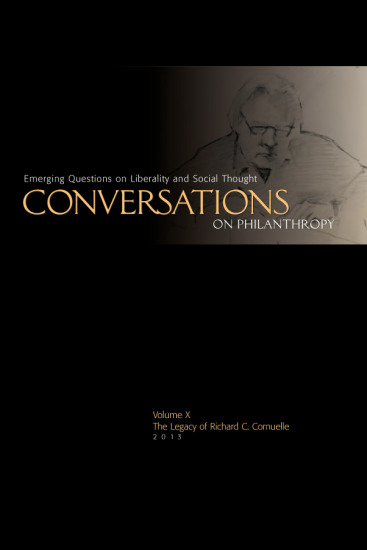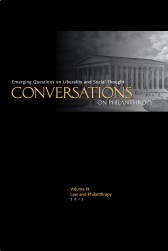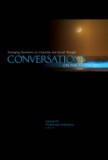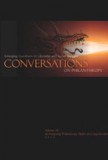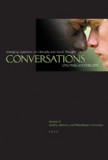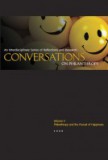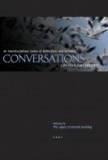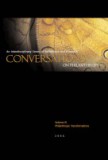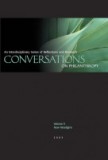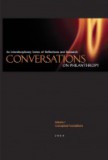Interested in learning more? Subscribe to our mailing list.
Conversations on Philanthropy is an annual publication of The Philanthropic Enterprise. Seeking to ignite reflection and discussion on the role of beneficence in the social order, Conversations features academic papers, essays, and reviews by scholars, philanthropists, and social entrepreneurs
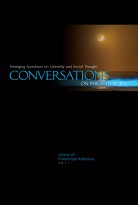
Volume VIII - Philanthropic Reflections, 2011
Introduction ![]() [+]
[+]
In the summer of 2010 the contributing editors of Conversations on Philanthropy convened to mark the tenth anniversary of the Project for New Philanthropy Studies and to set a course for the journal for the next decade. To focus our discussions, we asked participants to reflect on where we had been and to identify the critical challenges, opportunities, and needed developments philanthropy will face in the years ahead. This, our eighth annual volume, thus sits in the reader’s hand as a still point in a turning world, drawing light from the past and reflecting it toward the future. The light goes forth, we hope, not unchanged by the minds it encounters, both the authors’ and yours, the reader’s. Read More...
GUS DIZEREGA is the author of Persuasion, Power and Polity: A Theory of Democratic Self-Organization (2000). He is a leading theorist of evolutionary liberalism, a liberal ethic regrounded in awareness of our relationship with the earth, with all life, and with Spirit and growing in appreciation of how self-organizing systems actually work. He holds a Ph.D. in political science from the University of California at Berkeley and currently teaches in the Department of Government at St. Lawrence University. He is also a contributing editor toConversations on Philanthropy.
STEVEN D. EALY is a Senior Fellow at Liberty Fund, Inc., an Indianapolis-based educational foundation. He previously taught at Western Carolina University and Armstrong Atlantic State University. He has published on Jurgen Habermas, bureaucratic ethics, the Federalist Papers,and Robert Penn Warren.
ROBERT F. GARNETT is Associate Professor of Economics at Texas Christian University. His work in the philosophy, history, and pedagogy of economics has appeared in the Review of Austrian Economics, Review of Radical Political Economics, International Review of Economic Education, Review of Social Economy, Studies in Philosophy and Education, International Journal of Pluralism and Economics Education, Journal of Markets and Morality, Review of Political Economy, Journal of Economic Issues, Atlantic Economic Journal, and Rethinking Marxism. His current research examines the goals and methods of liberal learning in undergraduate economic education, the virtues of pluralism in economic inquiry, and the relationship between commercial and philanthropic forms of economic cooperation. He is also a contributing editor to Conversations on Philanthropy.
CHARLES H. HAMILTON is Director of Philanthropic Advisory Services at Bessemer Trust. Previously he was Executive Director of The Clark Foundation and the J.M. Kaplan Fund and has served on the boards of the Council on Foundations and the Association for Research Nonprofit and Voluntary Associations. He has edited several books on philanthropy and on intellectual history, including articles in The Foundation Review, Nonprofit and Voluntary Sector Quarterly,The American Scholar, Foundation News, and Philanthropy.
HEATHER WOOD ION is a chief executive and cultural anthropologist who holds dual degrees from Oxford University and specializes in turning around troubled organizations. Her doctoral research on social and cultural recovery from disasters has been applied to assist communities and corporations in trouble all over the world. She has turned around communities locked in adversarial paralysis, social service agencies, corporations that have lost their mission, and start-ups unable to cope with growth. For the last seven years of his life, Jonas Salk, MD, relied on Heather Ion as his editor, sounding board and collaborator on issues of international health policy, and in establishing the science of hope. Dr. Ion’s book, Thirdclass Ticket, has been translated into Italian, Hindi, Japanese, and Chinese, and is currently being made into a feature film. Another book, with Saul Levine MD, Against Terrible Odds, applies her knowledge of social and cultural recovery to the profound issues of individual resilience. Dr. Ion has served on numerous boards and national initiatives, including The Valeo Initiative, in collaboration with the Center for Healthcare Improvement and the Veterans’ Health Administration. She currently serves with Athena Charitable Trust, is Founder of the nonprofit Epidemic of Health and is a contributing editor to Conversations on Philanthropy.
JACK SOMMER is Knight Distinguished Professor of Public Policy Emeritus at the University of North Carolina, Charlotte and Chairman and President of the Political Economy Research Institute. Previously he taught at Dartmouth College and the University of Texas at Dallas. His past public service includes science policy analysis at NSF and Senior Advisor for Science and Technology at the U.S. Department of Housing and Urban Development. He is a Fellow of the American Association for the advancement of Science. His special expertise is in science policy and he is a contributing editor to Conversations on Philanthropy.
FREDERICK TURNER is the Founders Professor of Arts and Humanities at The University of Texas at Dallas. He is the author of thirty books of poetry, criticism, translations, and fiction, including The New World: An Epic Poem; Rebirth of Value; Genesis: an Epic Poem; The Culture of Hope; Beauty: the Value of Values; Shakespeare's Twenty-First Century Economics, and recently Paradise, Two Ghost Poems, and Natural Religion.
Symposium - Essays:
—Robert F. Garnett, Jr.
Conversations on Philanthropy is a Cornuellean legacy. As a catholic forum for reflection on the ends and means of voluntary cooperation, it advances Richard Cornuelle’s vision of a free and humane society. Dick’s celebrated gifts as a writer flowed from his generosity as a listener. He stirred readers’ minds by giving them (and his subject matter) his full attention and respect. He believed in the transformative liberality of conversation and bore witness to his faith through generous support for the Critical Review Foundation, the Fund for the Study of Spontaneous Orders, and the dialogical enterprise from which Conversations emerged: The Project for New Philanthropy Studies.1 Read More...
—Jack Sommer
In this essay I reflect on some ideas that have emerged over the years in this journal and some of its associated colloquia. These reflections concern four main thoughts: why one acts philanthropically; posterity versus the present in the calculation of giving; issues of moral hazard raised by Hardin, Rand, Machan and Kass, among others; and the myth of “sustainability.” I begin with an observation from the surroundings of my study which may act as a metaphorical bonding agent for the reflections that follow. Read More...
—Frederick Turner
The perennial question of philanthropy is: What do people need? And to look into the future, we must ask: What will people need?
As the wealth of the world increases exponentially (at around 5 percent per annum, doubling every fifteen years), and as transportation and communications improve, creating more opportunities for the wealth to spread, poverty will consist rather of a lack of informational goods than of the material needs of the human animal. Already the traditional pattern of fat, rich people and thin, poor people has reversed in many countries, and increased life expectancy is often more dependent upon what we wisely do not consume than on what we unwisely do consume. Read More...
—Gus DiZerega
One of today’s most important philanthropic issues is the need to empower hundreds of millions of non-wealthy members of society to make more focused and effective contributions to American life. Historically philanthropy has been regarded as primarily a responsibility of the well-to-do, with most other charities originating in the churches, and thus it has largely been addressed in terms of private (donor intent) or religious values. Modern circumstances, however, encourage a different perspective. Read More...
—Charles H. Hamilton
In the next decade we need more thoughtful discussion—and a deeper understanding—of the issues and implications surrounding foundation payout decisions. For instance, two questions about foundation practice should be discussed by donors prior to establishing a foundation, and thereafter they should be regularly revisited by boards. Based on the mission and the intended strategy of a foundation: (1) is the intent that the foundation exist in perpetuity or spend out over x number of years? and (2) what is the best desired spending rate to meet the mission and the longevity desired? Read More...
—Steven D. Ealy
A crucial problem confronting the world of philanthropy over the next decade will be a clarification of its self-understanding as a social and cultural actor. As Rebecca Solnit rightly reminds us, “What you believe shapes how you act” (2009, 2). Are philanthropic institutions a part of the private, non-governmental sector and thus an element in a vital civil society, or are they a part of the governmentalinstitutional sector? The quasi-governmental role played by the Red Cross as gatekeeper and certifier and the increasing involvement of nonprofits in seeking government funding and advocacy of legislative approaches to solving problems give rise to this question. In a 2010 essay in The Chronicle of Philanthropy Michael Edwards argued that “grant makers are among the forces hastening erosion of civil society” (29). Edwards’s brief essay reflects the confusion now surrounding both the notion of civil society and the nature of philanthropic activity. Read More...
—Heather Wood Ion
As technological change makes society increasingly complex and erodes traditional relationships, philanthropy must change to meet the demands of the new social environment. Top-down efforts by large organizations and a predisposition toward government action bring short-term results at best. What is most needed is a renewal of a widespread sense of shared responsibility, which is best fulfilled through independent, voluntary action at the level closest to the individuals needing help. As the spontaneous responses to disasters in recent years show, such a sense can indeed be sustained and is a powerful force for good. Read More...
Book Reviews: 
Reviewed by G. M. Curtis, III
The American history of printed primary sources has been rich and varied. Starting in the nineteenth century with the growing interest in preserving America’s memory of its Revolution and Constitution making, documentary editors in the early republic began what would become a notable part of American record-keeping as editors assembled lasting collections meant for the public. This practice during the twentieth century began to concentrate more and more on publishing primary sources for academic and scholarly uses rather than for a general audience. The advent of the Internet has altered the publication template yet again, now offering one-and-all access to both previously published letterpress editions of primary and secondary sources, as well as unpublished primary sources. One of the consequences of this, of course, has been the diminishment of letterpress publications of primary sources in American history that follow a chronological narrative or a specific historical subject. The intention of virtually all of these publications had been to help the reader to acquire a better “firsthand” understanding, one that as not colored by the intermediate voice of any historian’s narrative interpretation. In an age when we are awash in document, the services of skilled anthologists may be more important than ever. Read More...
Reviewed by Nicholas Capaldi
In 2010, Deirdre McCloskey published Bourgeois Dignity, remarkable for her erudite repudiation of all previous theories about how we arrived at the modern commercial world. McCloskey developed the thesis that modernity rejected hierarchy, the assignment to some people of more dignity (and privilege) than others, and that this recognition of the dignity of the bourgeois (what I would call a culture of personal autonomy) has led not only to the spectacular economic prosperity we see around us but that it liberated people, and that liberation is reflected in an expanding conception of human dignity. It’s a great book. Read More...
Reviewed by James R. Otteson
Adam Smith is one of the most beloved, most hated, most cited, and least read figures in the pantheon of great Western thinkers. His ideas have helped transform political and economic policy throughout much of the world, and they are credited by many for the unprecedented growth in wealth and prosperity the West has seen in the over two centuries since his death. They are also blamed by many for inequalities in wealth that have arisen since Smith’s time. But consider that since 1800 the world’s population has increased six-fold, and yet, despite this enormous increase, real income per person has increased approximately sixteen-fold.1 That is a truly amazing achievement. Yet that increased prosperity would seem due principally to the complex of institutions we now call “capitalism.” For the only thing that changed between two hundred years ago and the previous hundred thousand years of human history was the introduction and embrace of “capitalist” institutions—political, economic, and cultural. And Adam Smith stands as one of the founders of these institutions. Read More...
Reviewed by Frederick Turner
How could a devoted teacher of the humanities like this reviewer not like a book that is a ringing defense of the humanities in a world of educational “accountability”? Read More...
Reviewed by Dwight R. Lee
I enjoyed and learned from Sandel’s book, which is a far different thing than agreeing with many of the conclusions that he reaches. I read this book because I anticipated he would consider aspects of morality and markets that I have been writing about and do so in a way that would challenge my conclusions. I was not disappointed in this expectation. His challenge was clear enough, serious enough, and unconvincing enough to add to my own reservoir of arguments, few of which I have the space to elaborate here. Read More...
Reviewed by George McCully
To fully appreciate the significance of this valuable book by one of our leading practitioner/scholars, one needs to understand its cultural context within the profession. Bruce Sievers' has eminent credentials—trained in political science, former head of state Humanities Councils, then of the Walter and Elise Haas Fund of San Francisco (1983-2002), and currently at Stanford University's Center on Civil Society. This broad background positions him well to bridge philanthropy's two cultures—social-scientific and humanistic—in the current rapidly transforming period of paradigm-shift. Read More...
Reviewed by Laurent Dobuzinskis
This is both a biography in the usual sense of the term and an intellectual biography. One learns, in other words, about Marcel Mauss the man and the thinker, and these two aspects are rather well-meshed (but more about this below). Mauss, who is best known for his short essayThe Gift, was an armchair anthropologist—by that I mean that he never traveled to the American Northwest nor to the Pacific islands and never observed the customs of the indigenous peoples he wrote about; this has left him open to various criticisms. (This being said, Mauss did direct the field works of his numerous students who brought back useful data.) The originality and incisiveness of his ideas has earned him the respect of scholars in a number of disciplines. Fournier provides an apt summary of this essay and underscores its central theme, namely, that in pre-modern societies economic exchanges consist of “total services” affecting entire communities rather than among isolated individuals, and that these often have a religious dimension, such as the Polynesian belief in the hau, a spiritual power that “forces gifts to circulate, to be given and returned” (242). Mauss did not limit his attention to these arguably odd and disconcerting practices; he took pain to trace parallels with more western, and somewhat more individualized mores such as could be found in ancient Rome, and he thought about ways in which the spirit of the gift and the obligation of reciprocity could be rediscovered in modern times. But the value of this book, especially for readers who might not know more about Mauss than the fact he was the author of The Gift, is that it will help them to situate this essay in the context of a much larger and quite encyclopedic work. Read More...
Reviewed by Ann C. Fitzgerald
My most vivid lesson on volunteering came from an African–American woman who ran an after-school program for disadvantaged youth in Washington, DC, where I considered volunteering. Her program gave children a safe haven from homes and communities that were plagued by violence, drugs, and poverty. Speaking to an audience of potential volunteers made up mostly of white, middle-class professionals, she warned: “Don’t volunteer to help me unless you can make a real commitment. These kids have had enough disappointment in their lives.” Her frank comments stunned many in the audience but were borne out by experience with well-intentioned volunteers who appeared once or twice to help, only never to return. Read More...
Reviewed by Claire Gaudiani
“Authentic patriots do not set out to change the world. They set out to solve a problem.” Meet some people who will make you deeply proud to be an American, whether you are a liberal progressive, a Tea Party member, or somewhere in between. Stephen Kiernan’s Authentic Patriotism focuses on the demands democratic republics make on their citizens. Optimism and patriotism have become loaded concepts in the past few years. That may be because the media focuses us on major politicians and celebrities. That leaves the rest of us to watch and listen, 24/7. We watch flat screens, whatever size. Kiernan snaps our sets off. He introduces regular people, citizens like Dr. Howard Freeman, Barry Scheck, and Majora Carter. Kiernan’s casts are doers, not watchers. Read More...
Reviewed by Heather Wood Ion
James Workman has achieved what few authors can: he has written a gripping story that engages the reader’s moral passions and he has explored some of the most troubling economic and political problems facing our world without polemic or hyperbole. At the heart ofHeart of Dryness is the challenge of value: how do we value water? How do we value natural resources which are not being renewed? Who knows how to live in a world of depleted and diminishing resources? What can we learn from them? What do we need to do now? Read More...
Reviewed by Laurie Morrow
“If you’re happy and you know it, clap your hands!” goes the children’s song. According to Arthur C. Brooks, in his carefully researched Gross National Happiness: Why Happiness Matters for America—and How We Can Get More of It, those who are clapping are significantly more likely to be married rather than single, religious rather than secular, and conservative rather than liberal. Read More...
Reviewed by Max Borders
The more biology and economics inform each other, the better. Cross-pollination of ideas from one discipline to the next can yield great insights and shed light on answers to questions once hidden by the intellectual silos.
The late naturalist Stephen Jay Gould wrote: “[Th]e theory of natural selection is a creative transfer to biology of Adam Smith's basic argument for a rational economy: the balance and order of nature does not arise from a higher, external (divine) control, or from the existence of laws operating directly upon the whole, but from struggle among individuals for their own benefits.”¹ Read More...

